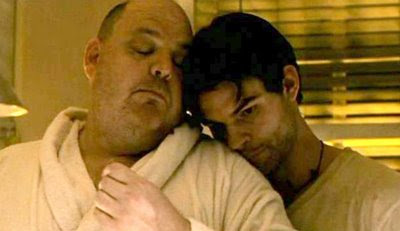Nicholas Pekearo’s The Wolfman
In honor of Memorial Day and the brave men and women who continue to protect our country and serve in the armed forces.
 Nicholas Pekearo’s posthumous debut The Wolfman has been dubbed “brilliant, insightful [and] overpowering” and for good reason. The werewolf of Pekearo’s novel is no Lon Chaney Jr. Marlowe Higgins a forty-something Vietnam veteran who’s inherited the mark of the beast from his father. The Higgins men have been cursed with lycanthropy ever since Marlowe’s great grandfather, a bounty hunter killed an Indian shaman called “the Mad wolf.” The curse is passed down from father to son, and after generations of suffering Marlowe’s father plans to end the curse himself. He kills Marlowe’s infant brother Jeffrey and intends to do the same to Marlowe, but in the end can’t follow through. His hopes for an end to the curse are later restored when Marlowe is drafted into the service and sent to Vietnam, a sure death sentence. But things don’t go according to plan and Marlowe survives the war while his father his struck and killed by a bus, transferring the curse to Marlowe.
Nicholas Pekearo’s posthumous debut The Wolfman has been dubbed “brilliant, insightful [and] overpowering” and for good reason. The werewolf of Pekearo’s novel is no Lon Chaney Jr. Marlowe Higgins a forty-something Vietnam veteran who’s inherited the mark of the beast from his father. The Higgins men have been cursed with lycanthropy ever since Marlowe’s great grandfather, a bounty hunter killed an Indian shaman called “the Mad wolf.” The curse is passed down from father to son, and after generations of suffering Marlowe’s father plans to end the curse himself. He kills Marlowe’s infant brother Jeffrey and intends to do the same to Marlowe, but in the end can’t follow through. His hopes for an end to the curse are later restored when Marlowe is drafted into the service and sent to Vietnam, a sure death sentence. But things don’t go according to plan and Marlowe survives the war while his father his struck and killed by a bus, transferring the curse to Marlowe.After the war Marlowe becomes a drifter, never staying in one place long before getting into drunken brawls and going on a killing rampage every full moon. His journey of self destruction is halted by Daniel Pearce, one of only two police detectives in the small town of Evelyn. Marlowe settles down with a job at Long Johns, the local restaurant and learns to control the wolf to some degree, only sending it after murderers, rapists and other evil doers. Marlowe sights his next target when a vicious serial killer, dubbed the Rose Killer moves into the county and starts murdering young women. But things go horribly wrong when instead of the Rose Killer, the beast slays an innocent bystander.
Pekearo reinvents the werewolf metaphor to represent the rage and pain caused by the repeated trauma faced by soldiers in Vietnam. Marlowe inherits the curse while in hunkered down in the green hell, surrounded by snipers and watching his friends being picked off one by one with tracer rounds. He breaks free of the unit after his fellow soldier Ritter takes a bullet to the head, covering Marlowe in a wash of gore. He makes a break for open ground and is felled by enemy fire, only to transform with the “pain of a thousand deaths” as the moonlight hits him. Pekearo also widens the scope of the werewolf metaphor to include not just the horrors of Vietnam, but other wars. All the Higgens men are ex-soldiers, Marlowe’s great-grandfather served in the Great War and Marlowe’s father was a soldier in World War II.
The symptoms of Marlowe’s werewolfism in particular find eerie parallels with post traumatic stress syndrome. During each transformation he blacks out and has no memory of his actions while under the influence of the beast. After the attack on his platoon, he’s found wandering the jungle naked with only his dog tags and is summarily discharged as a “burnout”. He blacks out a second time when he runs away with his girlfriend Doris, with disastrous results.
Nicholas Pekearo’s novel delves skillfully into one of the greatest traumas of American history to provide a fresh take on the werewolf myth and provide his readers with a chilling and compelling read.



Comments
Post a Comment